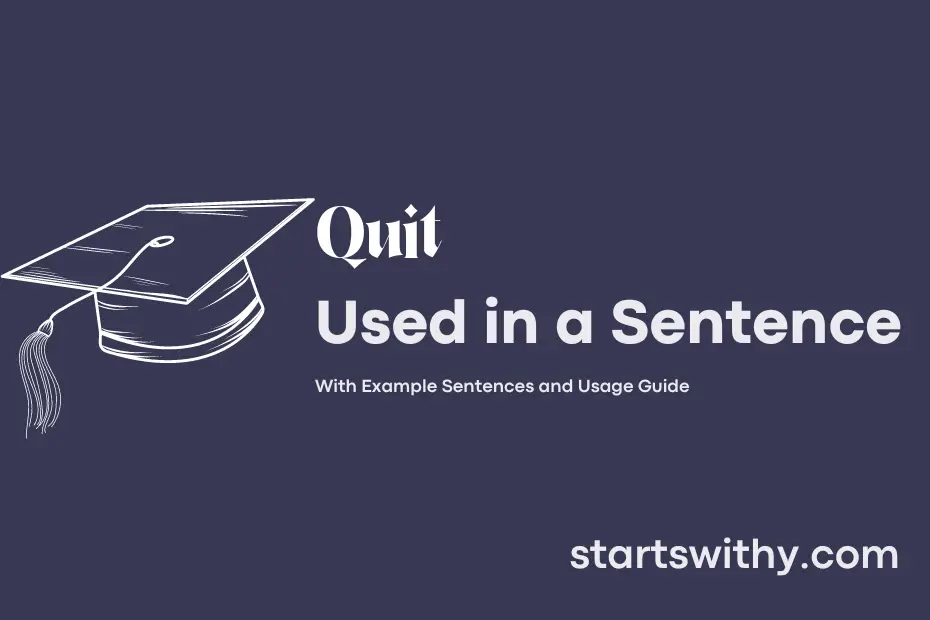Have you ever struggled with knowing when to walk away from a situation or end something? In the realm of linguistics, an example sentence with “quit” serves as a perfect illustration of this concept.
An example sentence with “quit” is a sentence that showcases the use of the word “quit” in expressing the action of stopping or giving up on something. It offers a clear demonstration of how this word can be employed in various contexts and provides a practical model for understanding its usage in everyday language.
7 Examples Of Quit Used In a Sentence For Kids
- Quit crying and let’s play together!
- Can you quit jumping on the bed, please?
- Let’s quit arguing and share our toys.
- I will quit singing if it’s bothering you.
- Please quit pushing in line, wait for your turn.
- Let’s quit running in the classroom, it’s not safe.
- Remember to quit shouting and use indoor voices.
14 Sentences with Quit Examples
- Quit making excuses and start studying regularly.
- It’s time to quit procrastinating and work on that assignment.
- Don’t quit on your dreams just because it seems difficult right now.
- Quit comparing yourself to others and focus on your own growth.
- If you’re feeling overwhelmed, it’s okay to quit and take a break.
- Quit waiting for the last minute to start your project.
- Sometimes you need to quit certain activities to make time for your studies.
- Quit skipping classes as it will only hurt your academic performance.
- It’s never too late to quit a course if you’re not enjoying it or it’s too challenging.
- Quit making impulsive decisions about your college major and take some time to think it through.
- Remember to quit unhealthy habits that can affect your physical and mental well-being.
- Don’t be afraid to quit a toxic friendship that is holding you back.
- Quit multitasking and focus on one task at a time for better results.
- If you’re feeling burnt out, it might be time to quit that part-time job and prioritize your studies.
How To Use Quit in Sentences?
To use “quit” in a sentence, you can follow these simple steps:
-
Identify the context: Determine the situation in which you want to use the word “quit.” It could be in the context of quitting a job, stopping an activity, or leaving a place.
-
Choose the right tense: Depending on when the action of quitting took place or will take place, select the appropriate tense. This could be present tense (quit), past tense (quit or quitted), or future tense (will quit).
-
Subject and verb agreement: Ensure that the subject of your sentence agrees with the verb form of “quit” you are using. For example, “I quit” (first person singular) or “They quit” (third person plural).
-
Construct your sentence: Once you have the context, tense, and subject-verb agreement in mind, form your sentence. For example, “She decided to quit her job and pursue a new career path.”
-
Check for clarity and accuracy: Before finalizing your sentence, review it to ensure it clearly conveys your intended meaning and is grammatically correct.
-
Practice and expand: Keep practicing using “quit” in sentences to become more comfortable with its usage. You can also try incorporating different forms of the word, such as quitting, quitter, or quitting, to increase your familiarity.
By following these steps and practicing regularly, you will become more adept at using the word “quit” in a sentence with confidence.
Conclusion
In conclusion, the examples of sentences containing the keyword “quit” in this article demonstrate its common usage in various contexts. Whether it be quitting a job, quitting a bad habit, or quitting a game, the word “quit” reflects a decision to stop or cease an activity. These sentences highlight the versatility and importance of the word when expressing the act of giving up or ending something.
From quitting smoking to quitting a relationship, the word “quit” encapsulates the idea of breaking away from something. It signifies a choice to abandon or discontinue a particular behavior, task, or commitment. By examining these sentences, we gain a better understanding of how “quit” is used to convey the concept of cessation or withdrawal in everyday language.



